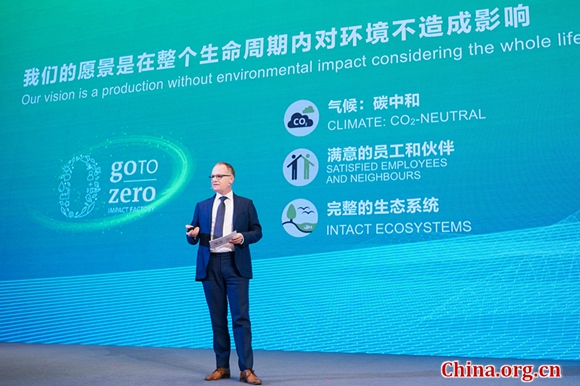FAW-Volkswagen backs green development with technological innovation
- By Zhang Rui
 0 Comment(s)
0 Comment(s) Print
Print E-mail China.org.cn, March 27, 2021
E-mail China.org.cn, March 27, 2021
At an event in Beijing on Wednesday, FAW-Volkswagen promised to back green development through e-mobility and digital transformation.
It also intends to use its influence to motivate organizations and individuals to participate in green public welfare, in hope of speeding up China's transformation and upgrading of its auto industry.

FAW-Volkswagen, which this year is marking the 30th anniversary of its founding, is promoting the upgrade of smart green factories, said Andreas Dick, technical vice president of FAW-Volkswagen, during his keynote speech at the launch ceremony of the 2nd Automotive Eco-friendly Innovation Project co-sponsored by FAW-Volkswagen and China Environmental Protection Foundation.
He added that FAW-Volkswagen intends to do this by accelerating the implementation of its e-mobility strategy, by deploying intelligent and connected new energy products, and by continuing to improve the construction of the NEV ecosystem.
"FAW-Volkswagen's vision is production without environmental impact considering its whole life cycle. This strategy includes not only achieving carbon dioxide-neutral production but also ensuring intact ecosystems, including the satisfaction of employees and neighbors," he said.
He added that the modular electric drive matrix (MEB) platform is the technical foundation and pillar of Volkswagen's product development and will be utilized for all of its pure electric mainstream vehicles.
On March 20, Volkswagen's ID.4 CROZZ, the first pure electric vehicle built using the MEB platform, was officially launched. This year, FAW-Volkswagen will also launch four additional new energy products. FAW-Volkswagen is also accelerating the development of its battery recycling projects to ensure the safe and environmentally friendly disposal of batteries.
According to what was revealed at the launch ceremony, the 2nd Automotive Eco-friendly Innovation Project will focus on 26 tasks in six areas: its automotive carbon neutralization strategy, charging infrastructure, new energy vehicles, energy-saving vehicles, intelligent transportation and environmental protection, and automotive pollution prevention and control.
The project will continue to advance industry-university-research cooperation to promote the development of environmental protection technology in the automotive industry, said the project's chief expert, Professor Li Xianjun, who is also the director of Tsinghua University Vehicle Development Research Centre.
In proposals for China's 14th Five-Year Plan (2021-2025), the government looks to support those who take an active approach to reduce carbon emissions, with the goal of building a "Beautiful China" by 2035.

The government work report of the Two Sessions this year detailed that during the 14th Five-Year Plan period, energy consumption per unit of GDP and carbon dioxide emissions per unit of GDP should be reduced by 13.5% and 18%, respectively. This indicates that the country has put green and low-carbon development as a strategic necessity for China's overall growth.
"Thank you to FAW-Volkswagen for donating funds to establish the Automotive Eco-friendly Innovation Project," said Tu Ruihe, head of the United Nations Environment Programme (UNEP) China Office. “This fully reflects that FAW-Volkswagen has a strong sense of social responsibility and attaches great importance to environmental issues related to the automotive industry."






Go to Forum >>0 Comment(s)